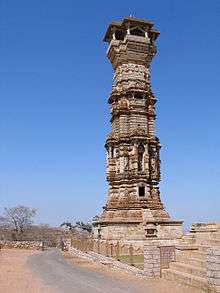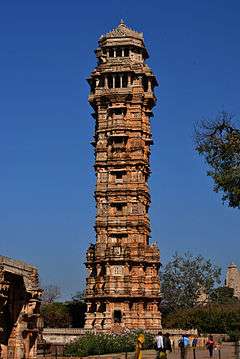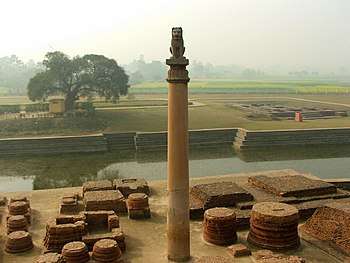Stambha
Stambha (also spelled as Skambha) is pillar or column found in India. In the context of Jain and Hindu mythology, it is believed to be a cosmic column which functions as a bond, which joins the heaven (Svarga) and the earth (Prithvi). A number of Hindu scriptures, including the Atharva Veda, have references to Stambhas. In the Atharva Veda, a celestial stambha has been described as an infinite scaffold, which supports the cosmos and material creation.

Kirti Stambha at Chittorgarh fort in Rajasthan, India
| Part of a series on |
| Hindu mythology |
|---|
 |
| Sources |
| Cosmology |
| Deities |
| Personalities of the Epics |
| Hinduism Portal |
| Part of a series on |
| Jainism |
|---|
 |
|
Jain prayers |
|
Ethics |
|
Major sects |
|
Texts |
|
Festivals
|
|
|
A Stambha was and is also used in the context of Indian architecture. Different Stambhas serve different purpose, including the following:
- Dhvaja Stambha – flagstaffs that are placed opposite the main shrine, on an axis with the main deity.
- Kirti Stambha or Vijaya Stambha – erected to commemorate victories.
- The most well known stambhas of India are the Ashoka Stambha (Pillars of Ashoka) erected during the reign of Ashoka, spread across the subcontinent, and which bear different types of royal edicts.
- Adi Purana – a huge manastambha stands in front of the samavasarana of the tirthankaras, which causes someone entering a samavasarana to shed their pride.[1]
Gallery
| Wikimedia Commons has media related to Stambhas. |
 Vijay Stambha at Chittorgarh fort
Vijay Stambha at Chittorgarh fort- Kirti Stambh of Hutheesing Jain Temple
 Ashoka Pillar
Ashoka Pillar
gollark: And that it'll still know stuff like when you arrive or leave... actually, do they have microphones?
gollark: And explicitly say Ring is Amazon?
gollark: Did you compare them, or something?
gollark: Until they aren't, naturally.
gollark: It doesn't help that lots of them rely on the company's backend services, which get provided for "free".
See also
- Related topics
- Hutheesing Jain Temple
- Ashoka's Major Rock Edicts
- Dhar iron pillar
- History of metallurgy in South Asia
- Iron pillar of Delhi
- Pillars of Ashoka
- Heliodorus pillar
- Other similar topics
References
- Shah, Umakant Premanand (1987), Jaina-rūpa-maṇḍana: Jaina iconography, Abhinav Publications, ISBN 81-7017-208-X
- Dictionary of Hindu Lore and Legend (ISBN 0-500-51088-1) by Anna Dallapiccola
This article is issued from Wikipedia. The text is licensed under Creative Commons - Attribution - Sharealike. Additional terms may apply for the media files.